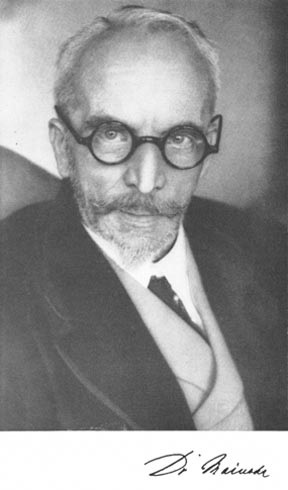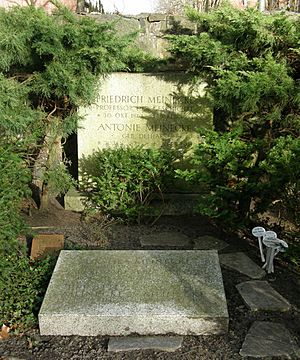Friedrich Meinecke facts for kids
Quick facts for kids
Friedrich Meinecke
|
|
|---|---|
 |
|
| Born | October 30, 1862 Salzwedel, Saxony, Kingdom of Prussia
|
| Died | February 6, 1954 (aged 91) |
| Nationality | German |
| Occupation | Nationalist historian Archivist (1887–1901) of the German State Archives Editor (1896–1935) of the Historische Zeitschrift Chairman (1928–1935) of the Historische Reichskommission |
| Known for | Historism |
Friedrich Meinecke (born October 20, 1862 – died February 6, 1954) was a German historian. He held views that supported German nationalism and unfortunately, also had prejudiced beliefs against Jewish people. He even supported the Nazi invasion of Poland.
After World War II, Meinecke spoke out against the Nazi government. However, he continued to express his unfair views about Jewish people. In 1948, he helped start the Free University of Berlin in West Berlin. He remained an important person until the end of his life.
Contents
Life and Work of Friedrich Meinecke
Meinecke was born in Salzwedel, which was part of the Kingdom of Prussia at the time. He studied at the University of Bonn and the Friedrich Wilhelm University in Berlin. From 1887 to 1901, he worked as an archivist, which means he managed important historical documents, at the German State Archives.
He became a professor at the University of Strasbourg. He was also the editor of a history journal called Historische Zeitschrift from 1896 to 1935. From 1928 to 1935, he led the Historische Reichskommission, a historical commission.
Meinecke's Views During World War I
During the First World War, Meinecke supported some controversial ideas. For example, he suggested moving Polish landowners from areas that Prussia had taken from Poland. He also proposed that Germans should settle in Courland (a region in present-day Latvia) after its Latvian people were moved out. Some people have compared these ideas to ethnic cleansing, which is the forced removal of a group of people from a place.
When the German Empire planned to take a large area of land from Poland and move millions of Poles and Jews to make space for German settlers, Meinecke approved of this idea.
Main Ideas in His Historical Books
Meinecke was well-known for his studies of German history in the 1700s and 1800s. His famous 1908 book, Weltbürgertum und Nationalstaat (which means 'Cosmopolitanism and the National State'), explored how national feelings grew in the 19th century.
Later, starting with his 1924 book Die Idee der Staatsräson ('The Idea of Reason of State'), much of his work looked at the struggle between Kratos (power) and Ethos (morality). He explored how to find a good balance between these two ideas.
Meinecke Under the Weimar Republic
One of Meinecke's students was Heinrich Brüning, who later became the Chancellor of Germany. During the Weimar Republic (the German government after WWI), Meinecke was a Vernunftsrepublikaner, meaning he supported the republic because he saw it as the best option, even if he didn't fully love it. In 1918, he helped start the German Democratic Party.
Meinecke and the Nazi Era
When the Third Reich (Nazi Germany) came to power, Meinecke initially had some sympathy for the new government. He especially supported some of their early laws that were unfair to Jewish people. However, after 1935, he lost some of his influence and was removed as editor of the Historische Zeitschrift.
Even though he publicly supported the Nazi government, Meinecke privately became more and more troubled by what he saw as the Nazis' violent and crude actions. Despite this, he openly said he was "anti-Semitic," meaning he held prejudiced views against Jewish people. While he was willing to have Jewish friends and colleagues, the Nazi persecution of Jews did not bother him much.
After Germany invaded Poland in 1939, he wrote a letter expressing approval for the military campaign.
Reflections After World War II
One of Meinecke's most famous books, Die Deutsche Katastrophe ('The German Catastrophe') from 1946, shows him trying to understand how his belief in strong government power fit with the terrible events of 1933–1945. He suggested that the success of Nazism was due to Germany's military past, fast industrial growth, and weaknesses in the middle class. However, Meinecke also claimed that Nazism benefited from a series of unlucky events that had nothing to do with earlier German history.
Meinecke saw Nazism as an "outside force taking over Germany." Sadly, he also continued to express prejudice against Jewish people. He wrongly claimed that Jewish people were responsible for antisemitism and blamed them for the decline of liberal ideas. His book The German Catastrophe showed two common themes of antisemitism: resentment based on Jewish economic activities and their supposed "character."
In 1948, Meinecke played a key role in establishing the Free University of Berlin.
The British historian E. H. Carr used Meinecke as an example of a historian whose views are strongly shaped by the Zeitgeist, which means the general spirit or mood of a particular period of history. Meinecke was liberal during the German Empire, felt discouraged between the World Wars, and was very pessimistic after World War II.
Works
- Das Leben des Generalfeldmarschalls Hermann von Boyen (2 volumes, 1896–1899) (The Life of Field Marshal Hermann von Boyen)
- Das Zeitalter der deutschen Erhebung, 1795–1815 (1906) (The Coming of Age of Germany). Translated into English by Peter Paret as The Age of German Liberation, 1795–1815 (full view on Google Books), based on the 6th German edition, 1957. Berkeley: University of California Press, 1977, ISBN: 0-502-003454-6
- Weltbürgertum und Nationalstaat: Studien zur Genesis des deutschen Nationalstaates (1908) (Cosmopolitanism and the Nationstate: Studies in the Beginning of the German Nationstates)
- Radowitz und die deutsche Revolution (1913) (Radowitz and the German Revolution)
- Die Idee der Staatsräson in der neueren Geschichte (1924) (The Idea of Reason of State in Modern History)
- Geschichte des deutsch-englischen Bündnisproblems, 1890–1901 (1927) (The History of German–English Partnership Problems)
- Staat und Persönlichkeit (1933) (State and Personality)
- Die Entstehung des Historismus (2 volumes, 1936) (Historism: The Rise of a New Historical Outlook)
- Die deutsche Katastrophe: Betrachtungen und Erinnerungen (1946) (The German Catastrophe: Contemplations and Recollections)
- 1848: Eine Säkularbetrachtung (1948) (1848: The Year in Review)
- Werke (9 volumes, 1957–1979) (Works)
See also
 In Spanish: Friedrich Meinecke para niños
In Spanish: Friedrich Meinecke para niños
 | Percy Lavon Julian |
 | Katherine Johnson |
 | George Washington Carver |
 | Annie Easley |


